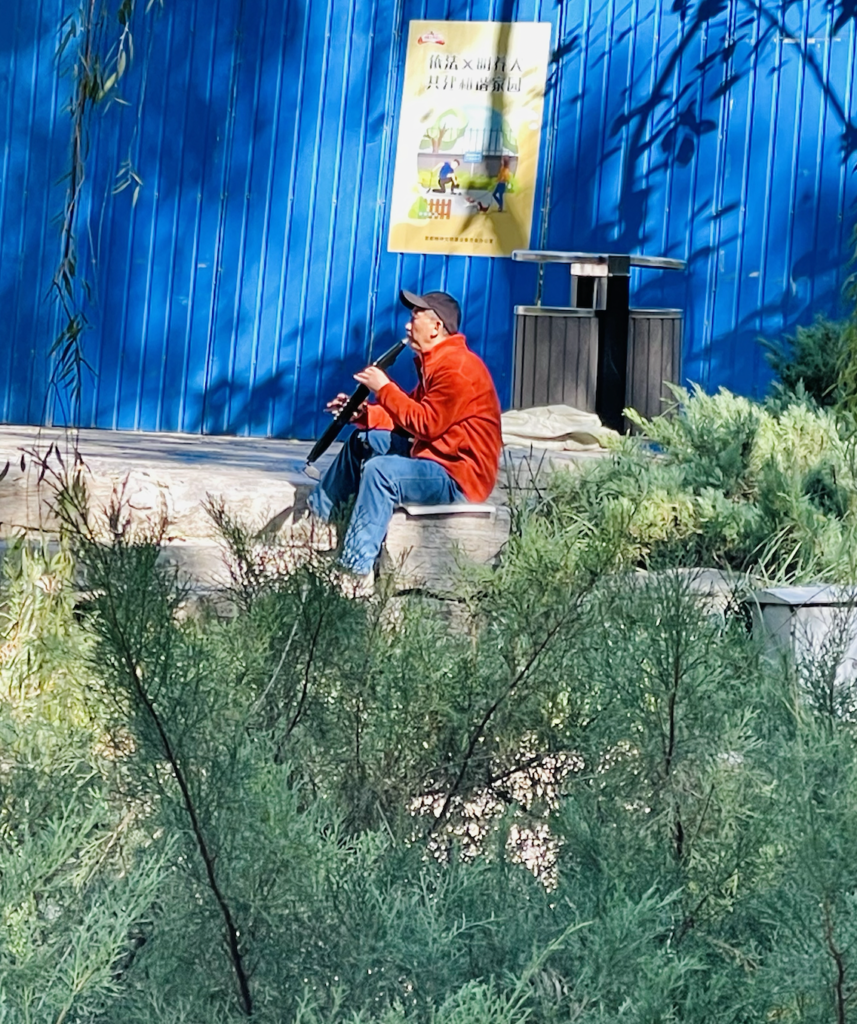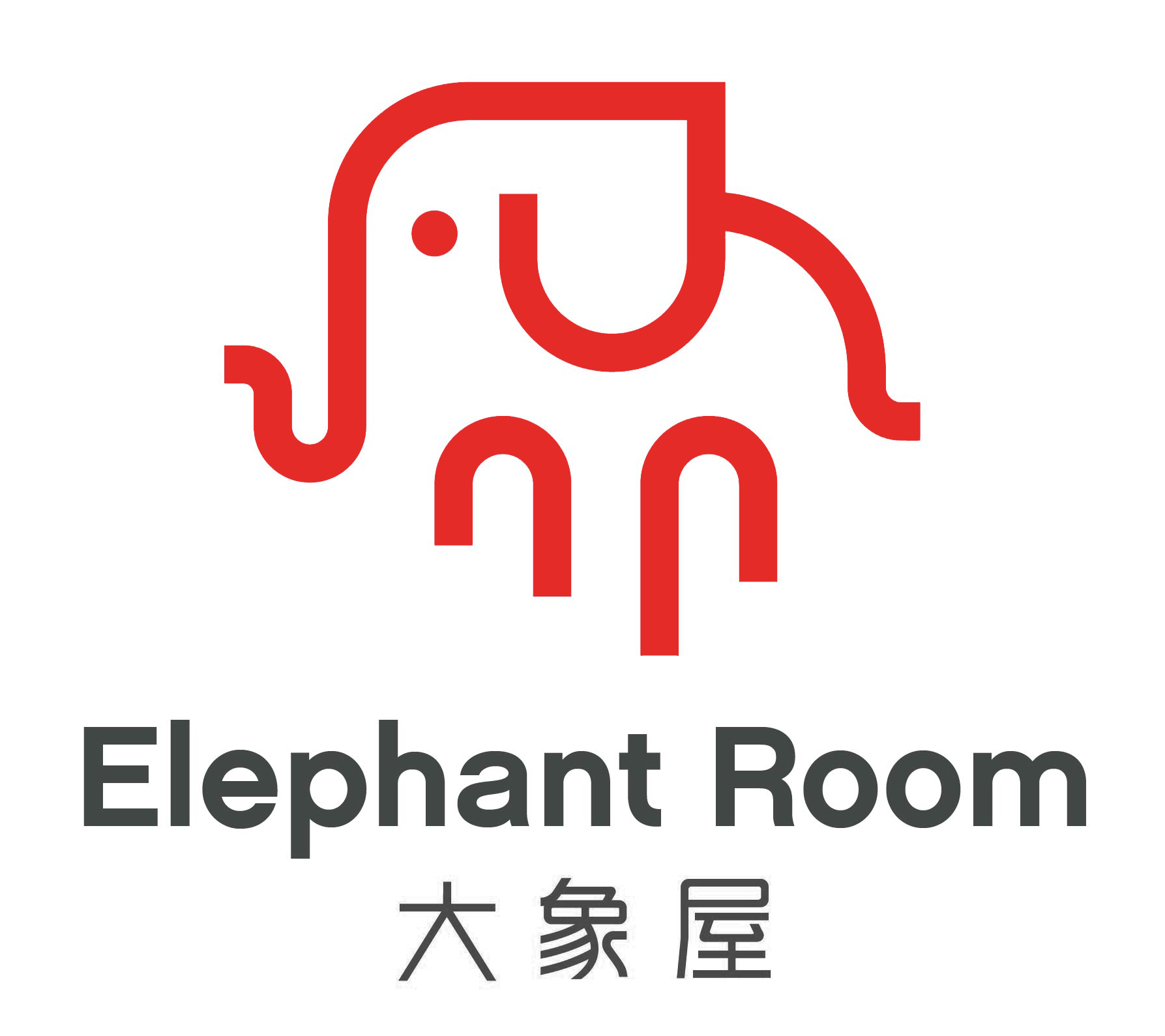Five years ago, in the summer of 2017, we wrote an article about our adventure into one of Beijing’s marriage markets. Throughout our time there, we acted like naive, arrogant little bunnies being accidentally thrown into a wolf trap. Awkward and curious, we were fascinated by the various aspects of the scenario. Meanwhile, we felt frightened.
The two of us were both 25 in 2017. We had just got back to China and started writing Elephant Room. We tried to embrace everything in our motherland with an open mind, yet we were often judgmental, viewing things that we couldn’t understand as kitsch. Marriage market back then was among one of those things: we found it interesting because it is s”strange”, but we were unable to relate to it at a more personal level.
We have turned 30 this year. In the past five years, many things - those in this great, messy world, in China and in our personal lives - have changed or even turned upside down. Often we’d wake up feeling dazed, wondering with each other and with ourselves: what’s going on with the world and what have we become?
Time to revisit the marriage market, we thought.
Day 1: Tiantan Park
Tiantan is huge with strict security checks. After passing through iron-fenced gate, scanning our pre-purchased tickets and HealthKit QR-codes via our phones, we found us walking on a majestic boulevard toward one of Beijing’s most iconic imperial buildings: the Temple of Heaven. The park was filled with locals (tourists have disappeared in Beijing thanks to Zero-Covid), bursting with a breezy and lively atmosphere that made us wanted to walk faster.
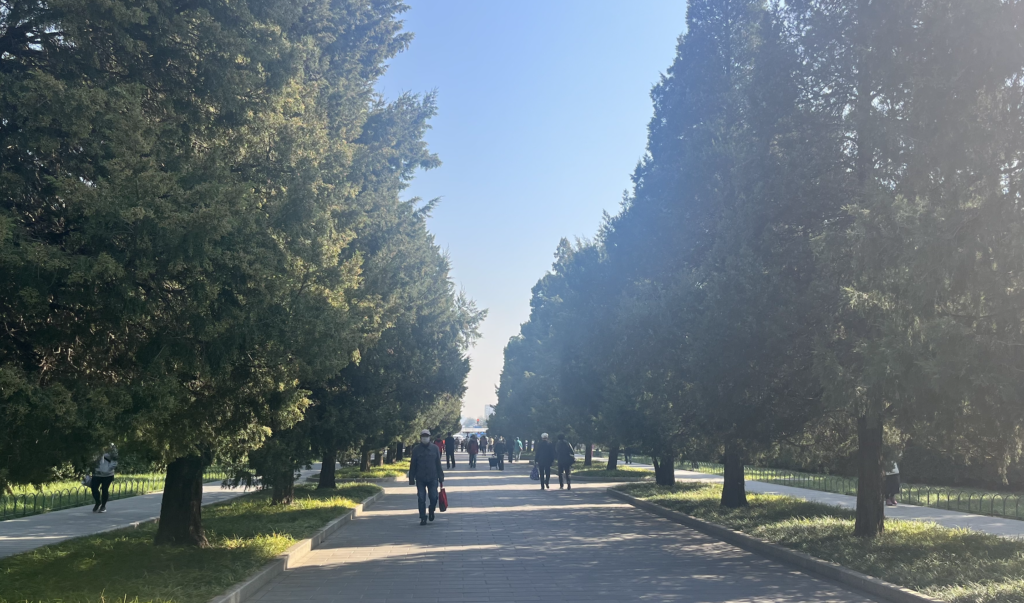
A beautiful day in a beautiful park.
“大爷(“old fella”, a respectful title for elderly male in Northern China), do you know where the marriage market is?” We approached an elder man with an “insider” look and asked. “Down there in the left,” he nodded to one direction, “It should be crowded there.”
大爷 is always right. Arriving at the marriage market located on a vacant, cruciform road deep inside the woods, we were immediately overwhelmed by the overcrowdedness. Unlike the marriage market we went last time of which parents sat in order, here, people were moving and mingling randomly. Some were practicing in the usual way: sitting on a camp chair with a sheet of advertisement (of their children), but many were adopting a more dynamic strategy, walking around and staring at their competitors’ information while checking out potential preys.
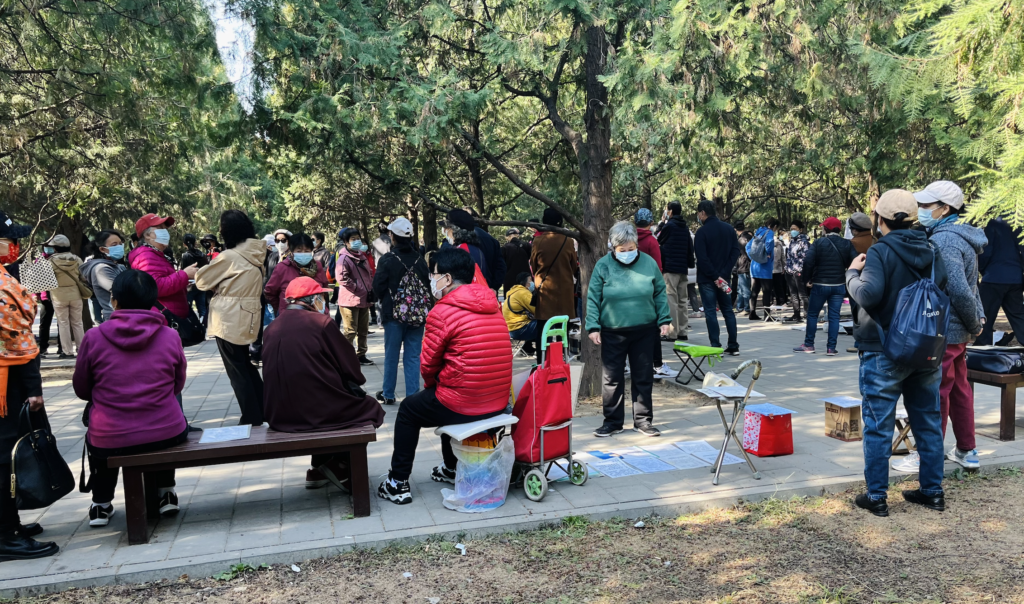
Preys like us, for instance. When we just set foot on the pavement, an elder male in a red jacket immediately approached us. “Hello girls. How old are you two?”
Here comes the age, the important, classic topic of the top priority in matchmaking markets. After age follows a series of questions on hukou (to check if you are a true Beijinger), education, career, Chinese zodiac and others. Since we are females, possessions (house and cars) are not as crucial on their agendas.
We suddenly felt a sense of attachment. Five years ago, we were bombed by the exactly same list of questions. The world might have changed dramatically in five years but the parents in marriage markets still care about the same things. How comforting is it to know this!
As we chatted with the red-jacket man (we proudly claimed that we are 30 years old and he asked, “do you mind a boy who’s younger than you?”), more parents came over, asked similar questions and gave their comments. The situation quickly fell into chaos as I had to answer questions on my education background for one while chiming in with the other’s comment regarding my Chinese zodiac (“You are born in the year of monkey and my son the dog, good match!”). Yan was being occupied too with a mother so interested in her that she began to take down Yan’s phone number.
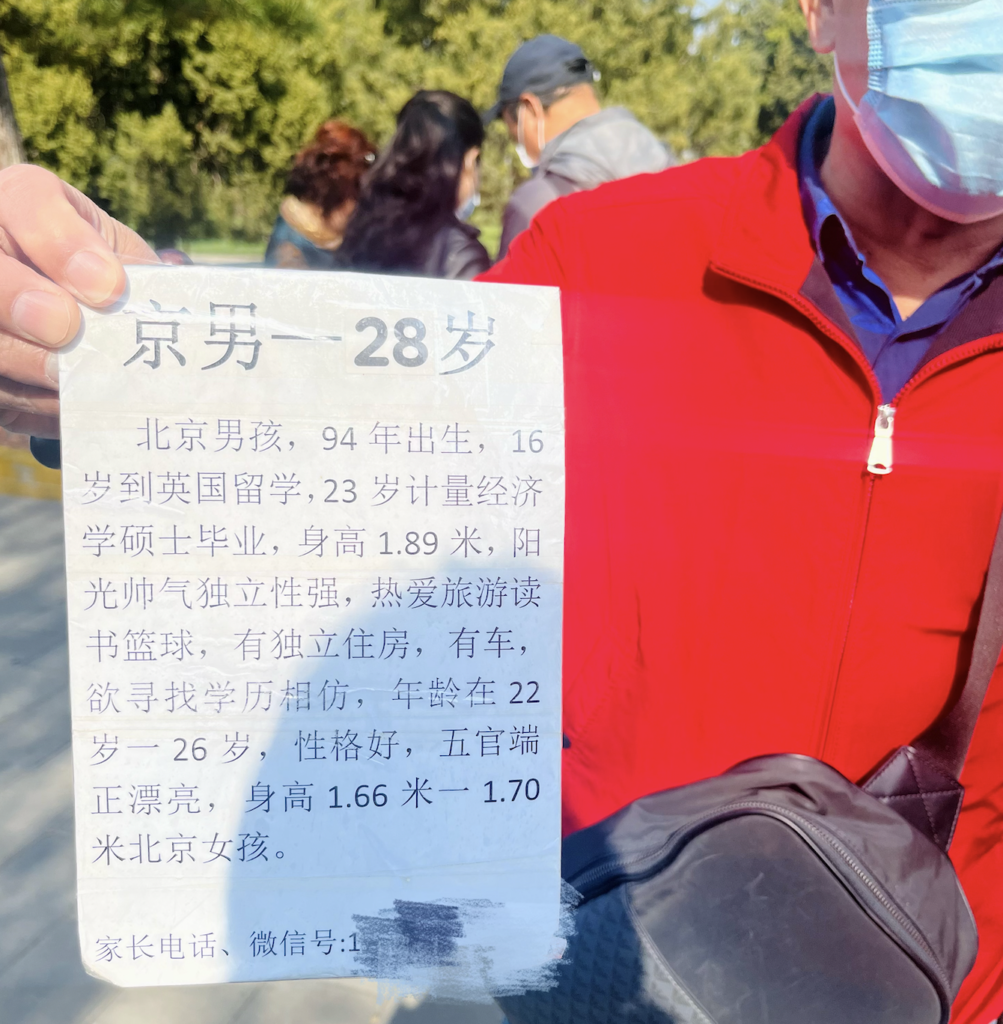
The red-jacket man who (seemed) to adore us.
The siege was intense with some questions rather rude. After I confessed to a woman that I already have a partner she said, without hesitation, if I had any plan to divorce (“My son doesn’t mind divorcee!”). Not knowing how to respond, we had to squeeze our best fake laughs for times to keep the conversations on.
Those dry laughs took some efforts, but we didn’t feel awkward or bored mingling with them. The perk of getting old is that with age comes greater empathy. As we stood on the pavement being surrounded by this group of strangers most of whom are older than our parents, we no longer felt overwhelmed. These parents, some desperate, some fierce, some snappish, don’t look as aliens to us anymore as they did five years ago. So, instead of shying away, we felt at ease, engaged in the conversations and even asking about their personal stories. At the end, both Yan and I left our phone numbers or WeChat IDs to some parents. “Send me photos of your girl-friends who are single tonight!” The wished-me-divorced woman gave me a firm pat on the shoulder and hand me the sacred task.
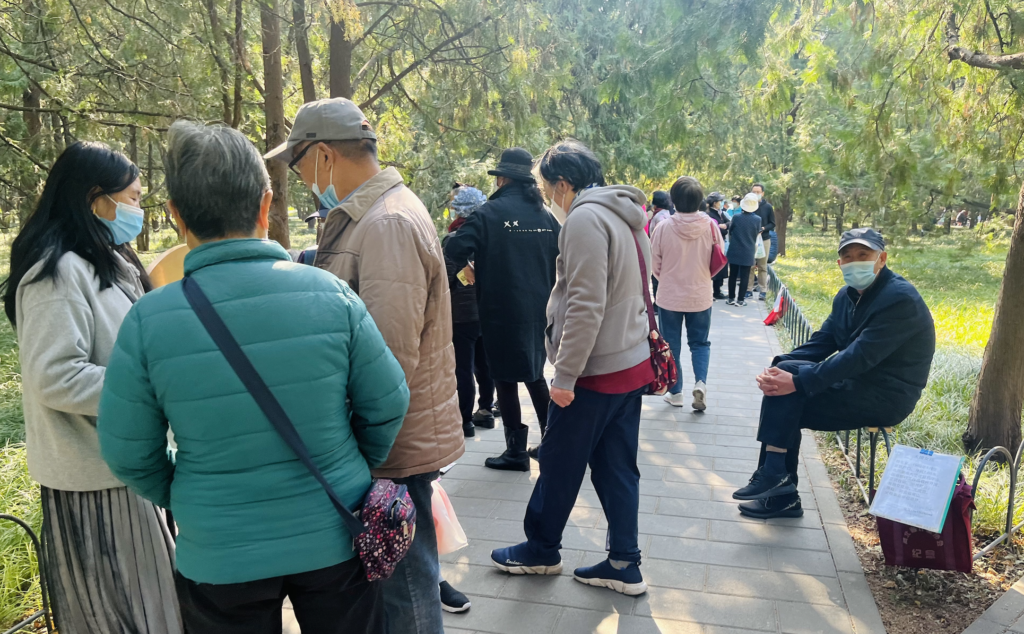
Though we enjoyed chatting with them, this form of interaction became a little too intense after a while. To take a break, we excused us and elbowed our ways through the crowds. For a while, we immersed ourselves in the endless flyers. Not so surprisingly, in today’s marriage market, the main that were being introduced are those born from 1985 to 1995. The number of females still surpasses the one of males although the number of males seems to have risen comparing to five years ago.
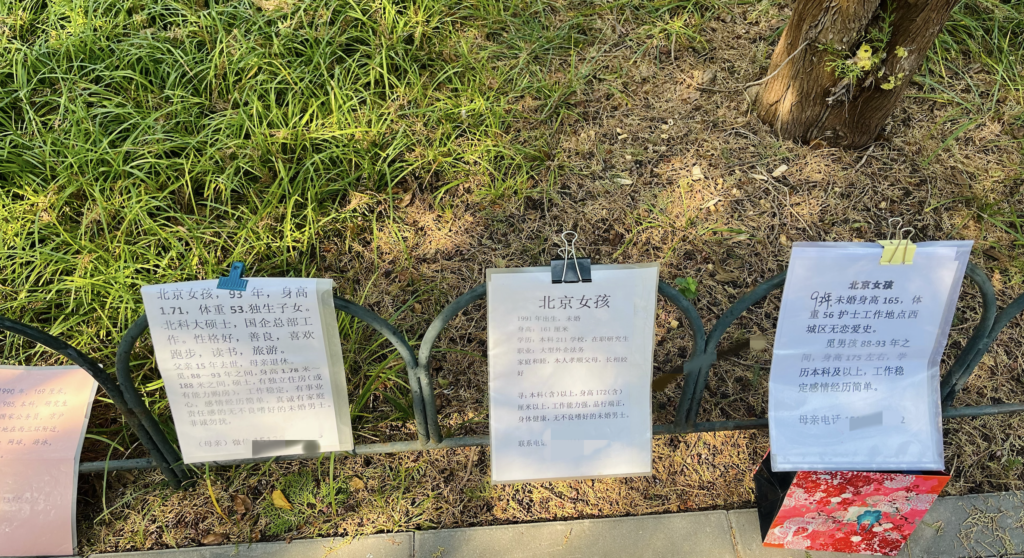
A corner of "Beijing-native girls".
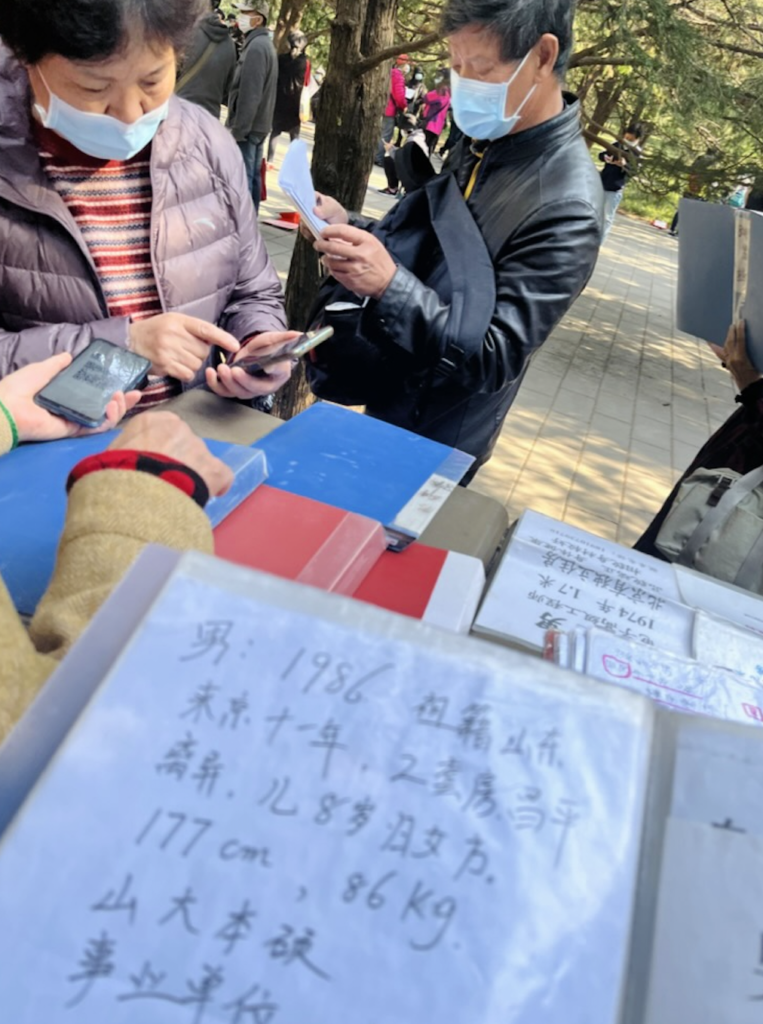
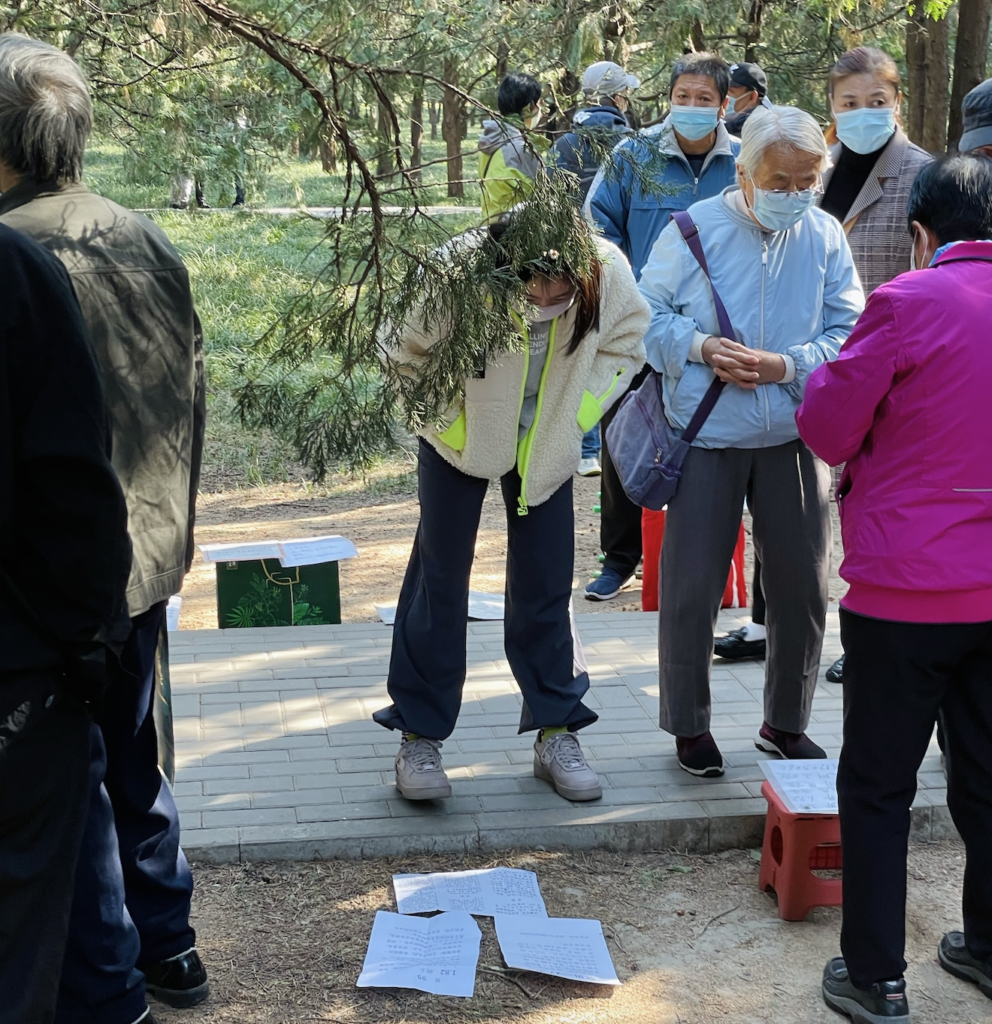
Yan checking (and being checked).
It was nearly noon and many parents in the market began to leave for lunch. We walked out with them, casually chatting with someone. Those who added our WeChats reminded us to contact them later, and others asked if we could bring young, fitted (decent looking, Beijing-born with houses, cars and decent jobs, preferably civil servant or working for state-owned companies) boys to them next time. We laughed and promised to try our best to search some for them (in reality, the kind of boys they look for are literally extinct).
As we stood at the park exit to head out, we bumped into a guy with an A4 flyer in his hand. He looked younger than most parents we just met, probably in his 40s, looking well-educated with glasses and a suit jacket.
“Are you here to find partner for yourself?” We asked him curiously. “No, no, no, I am here for my son.” Without further question, he took out his phone and showed some photos of a boy who looks as young as a high school teenager. “How old is your son? He looks like a little boy!” We cried. “He is 20! A good kid. He is in Waseda University in Japan.” The man stared at his screen, smiling and looking proud. “Oh my god, he is so young! And in college! His dating is the least thing you need to worry about!”
“But I don’t want him to find a Japanese woman, they rely on their husbands too much.” The man replied us in a serious tone, “I’d rather he date a Chinese girl who is willing to go to Japan with him. My wife and I have a house and a company running in Tokyo. We don’t like Japanese. I come to this market every time when I come back to Beijing. Better find someone for my son quicker!”
We stared at this man, wanting to ask him some more questions but not knowing where to start. Eventually, we waved goodbye and headed to the parking lot.
“Do you know what that woman said to me after saving my phone number?” Yan said as we drove away from the Tiantan Park. “She asked if I had any 同居史(cohabited with anyone). She told me her son is a Phd and she’s looking for him a virgin.”
The number of first-time marriages in China continued to decline after reaching a peak of 23.86 million in 2013. It has dropped to 12.29 million in 2020, down 48.5% from 2013. In 2013, the number of marriage registration in China was 13.47 million pairs, and in 2021, the number of marriage registration dropped to 7.64 million pairs, a decline for eight consecutive years. In addition, the age of first marriage has been greatly delayed.
Day 2: Changpuhe Park
Our second destination is Changpuhe Park, a place that had long stayed on our bookmark list because of its mysterious marriage market for the older.
In 2018, #Changpuhe became a trending topic on Chinese social media thanks to a documentary/interview series “和陌生人说话”. In that 40-minute episode, cameras followed a number of single, retired males with a regular routine: visiting Changpuhe in search of love and sex.
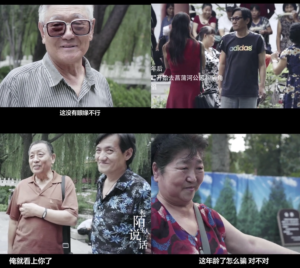
Screenshots from the documentary episode.
For over two decades, Changpuhe, a tiny park with a riverside boulevard that cuts right across Tian’anmen Square, has been the epicenter for the single elderly. According to the documentary and a few other online sources, for a few mornings and afternoons every week, the park would be filled with some kind of “retiree mixers”, Chinese style. Males and females, mostly divorced or widowed, come here to dance, sing, play pokers and chat with an unspoken yet overt purpose: to find someone to date, get married or have fun with. In short, it was known as a marriage market for the older for whom it’s certainly not just about marriage.
Contrary to our common perception, China has entered the aging society earlier before we were aware. According to the 7th national census, there are 264 million people aged over 60, accounting for 18.7% of the population. In 2017, the population of the divorced/widowed elderly is 47.26 million, accounting for 29.85% of the 65s and above. A significant part of this population are willing to find another spouse, but we could find few information on how they are engaging in the courting activity.
Determined to find out what Changpuhe is about, we headed to the park on a Saturday, a time when, according to some outdated RED (小红书, a popular platform for lifestyle and experience sharing) posts, the mixers would storm there.
It was a beautiful autumn day with the best possible weather one could ask for. It was fuzzily warm, and under crispy blue sky the trees were still flourishing with potent green. Wangfujing, the area where the park locates, was covered with a duvet of quietness. Thanks to Beijing’s Anti-Covid regulations, the once touristic district had been emptied out with most shops shut down and streets cleared.
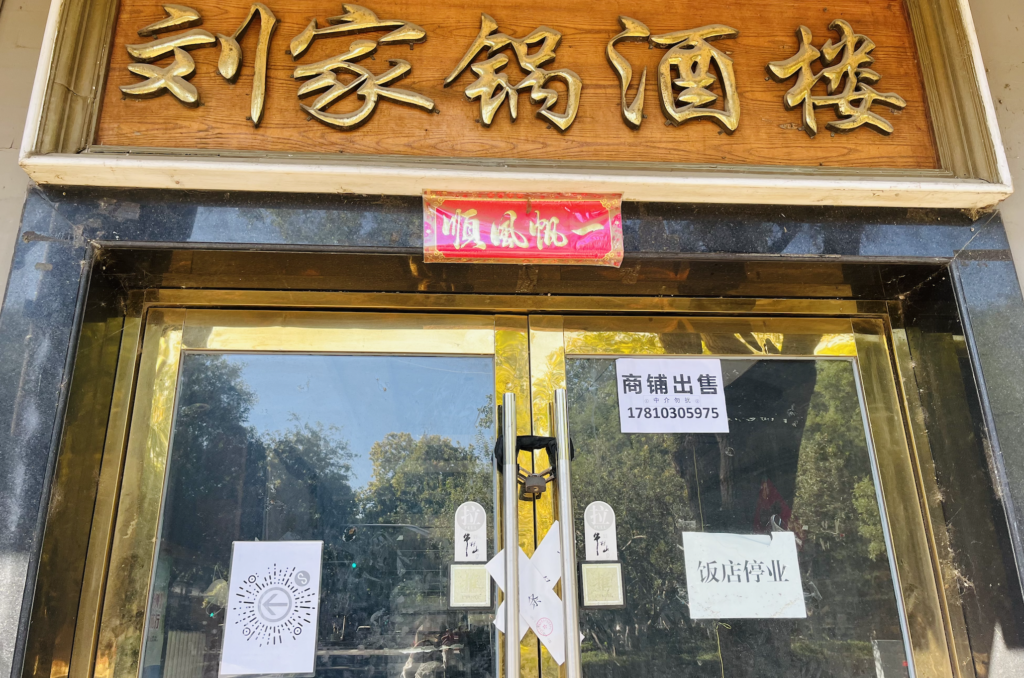
Most shops we saw on our way to Changhuhe were shut down like this.
The park’s entrance guard nodded perfunctorily to let us in after we scanned the HealthKit QR code and showed our phone screen to him, perfunctorily too. We stepped into the park, passing through clusters of carefully arranged green plants and flowers, police guards, fences that blocked public roads and red banners shouting “no gathering, no socializing for a successful Anti-Covid campaign” and slogans alike. On one of the tall trees hangs a white loudspeaker, playing a pre-recorded notification on repeat:
“Defending Covid is everyone’s responsibility. No gathering permitted inside the park. No cards-playing. No dancing. Keep safe social distance.”
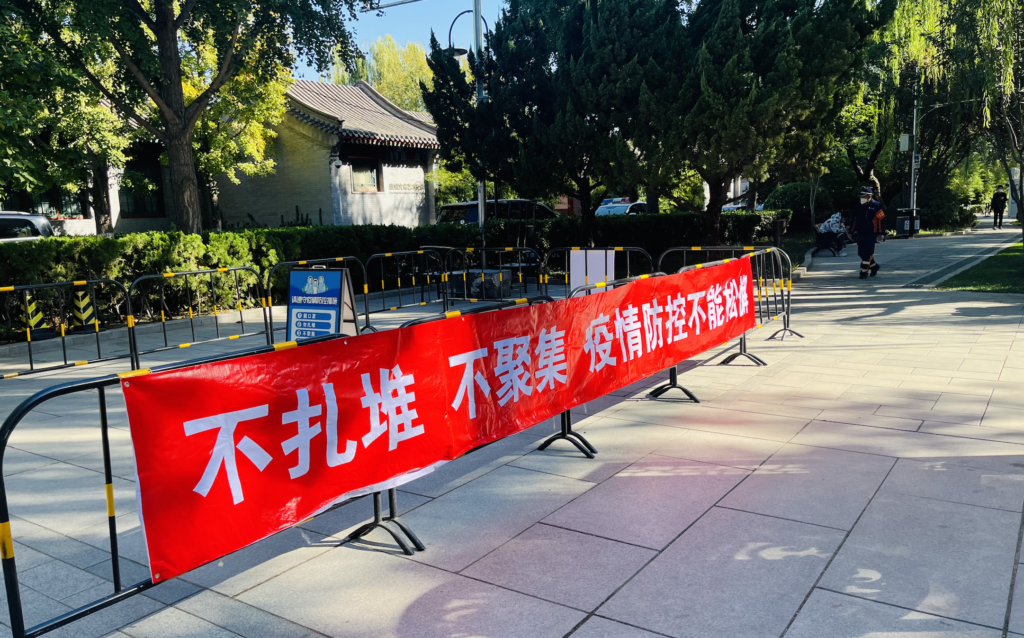
The number of Covid cases was rising in Beijing but it’s not dampening the elder to kindle new friendship. As we walked toward the river, we soon spotted some elderly males and females gathering in groups of two or three, exchanging their personal information and expectations.
A cluster of fashionably dressed elderly people gathered in front of a tiny square right next to the nucleic-acid test station, dancing in pairs or alone to loud, rhythmic music. From disco music to pop songs, people switched their dance rhythm fluently with many looking professional with their moves. The music and hubbub of people chattering formed a speechless protest against the distant yet mind-numbing Anti-Covid broadcast.
We stood on the sideway, watching. The square was structured like a virtual ballroom with ladies and gentlemen standing at the edge of the dancing area, waiting for a partner to invite them to dance. Once the ice was broken after dancing, they would start the real conversation and perhaps exchanging WeChats.
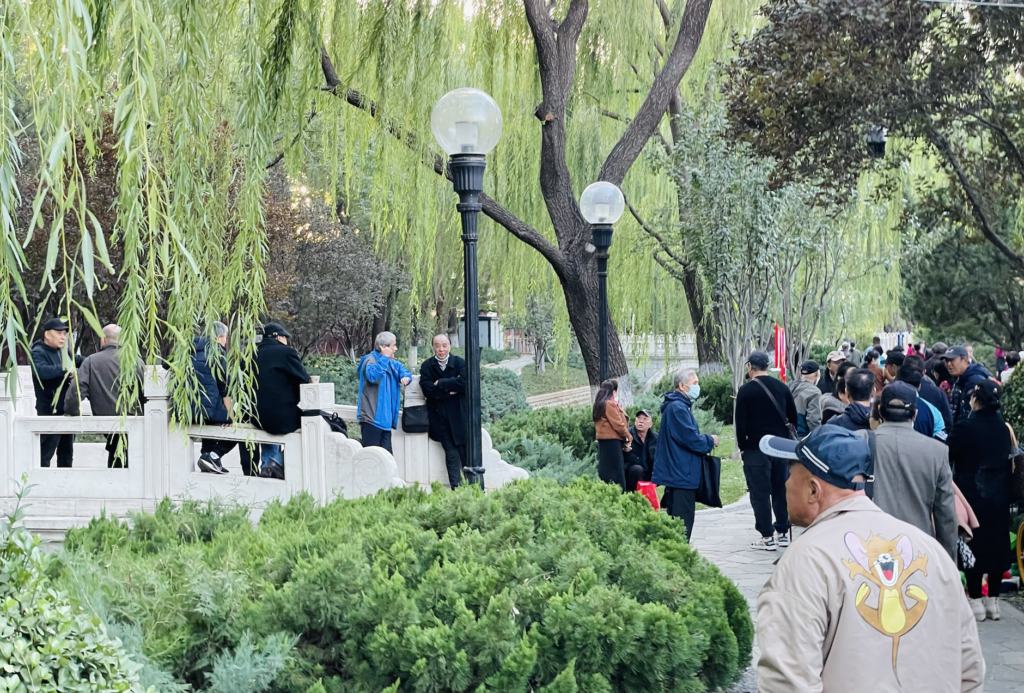
“I heard people came here to find 老伴儿 (partners)?” Yan tried to pick up a conversation with the 大爷 standing next to us. “Yes. Some for a real partner, some for fun, some for cheap services.” “Cheap services?” We raised eyebrows. “Yes, not everyone is here for serious business.”大爷 quickly changed to a topic he was more interested in, “so how old are you? Are you single?” “Me? Not available, sorry, I have a boyfriend.” Yan said. “How about dump him for me?” 大爷 squeezed a mischief smile and disappeared in the crowd.
Perhaps noticing we were open for conversation, another 大爷 approached Yan. “What are you doing here young lady?” “Just checking what the fuss is all about. And considering finding a 老伴儿 for my mother here”.
“Is she divorced or widowed? Is she retired? Where does she live? Do you have a photo of her?” 大爷 immediately ranted her with a series of questions. As it turns out, the matchmaking market for the elderly follows the same rule: those with housing, automobile properties and retiring social benefits are on the top of the list. Living alone is better than living with their children, and having a daughter is better than having a son and the son is better to be married than not.
Yan started to think about her mom, single, young, living alone with two grown-up daughters. Perhaps she would be quite a hit?
“Take your mom to the park tomorrow morning. People would want to see her in person. Oh by the way, she has a Beijing hukou right?”
Alas, in marriage markets, education, knowledge, or a warm loving family accounts for nothing when it comes to the ID number starting with the precious 11010 - the digits that signify someone is a true Beijinger.
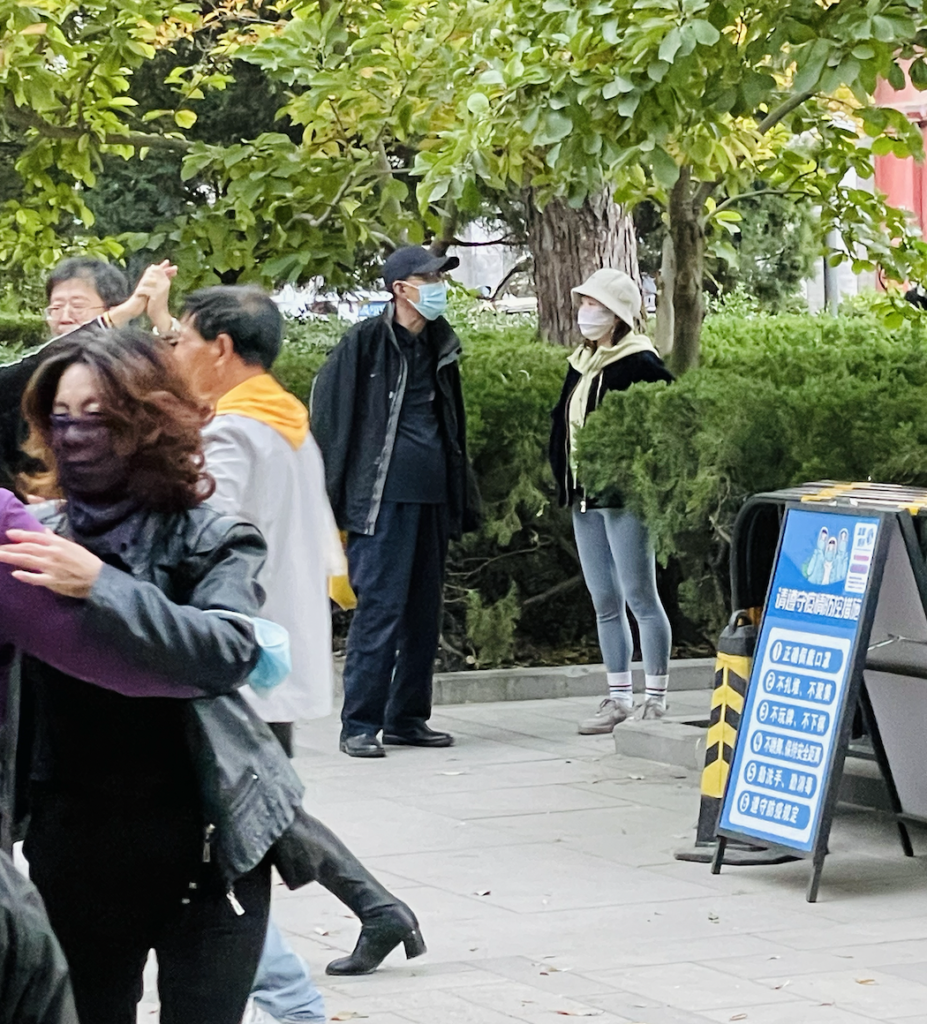
Yan and 大爷.
On a small arched bridge over the river, we saw a male retiree in basketball hats and (fake?) Yeezy, presumably in his late 60s, chatting with two women who appeared as friends.
“You have a house in Beijing, don’t you?” One of the women asked. “Of course, a big one with yard! ” The man responded with confidence.
Their conversations continued compactly yet casually (we tried very hard eavesdropping indeed). After house then came kids, “They have nannies so I am free from grandchildren duties!” Yeezy man said proudly. Then they moved on to past marital and work experiences, and, shockingly, to sex.
“What’s your attitude on 性生活 (sex life)?” The woman asked. Her friend laughed out and added, “Yes yes, this is very important!”
“Certainly!” The man answered immediately, “Sex is key. I don’t need sex everyday but I definitely want it every few days. Sex is good! We all need sex!”
Yan and I looked at each other as we thought of the older lady in Tiantan who was looking for a virgin for her 40-year-old son. We were glad that at least not everyone of the elderly generation thinks sex is forbidden. In fact, to talk about sex with strangers normally in today’s China is rare, not to mention it by the elderly.
How joyful and reliving to hear a conversation like this. Even the willows on the walkway began to swing their branches.
Although China’s single elderly people are open for re-marriages, they are facing more critical issues such as shorter marriage expectancy and heritage distributions. Forms of elderly coupling are more diversified — from officially register to more loosened cohabitation (同居). It is worth mentioning that, interestingly, in the elderly matchmaking market the gender difference is still present, perhaps even more unevenly distributed. According to the 5th national census, 18.72% of male who are over 60s are widowed, while the percentage for female is 41.84%. Out of cultural norms, females are more keen on finding spouses who are older than themselves, yet they are often more burdened with domestic responsibilities such as taking care of their children and grandchildren. Accompanied with the fact that females have longer life expectancy, it is perhaps even harder for elderly woman to find spouses.
We spent some more time hanging, watching, eavesdropping and chatting with people. A female retiree was singing Karaoke with some guys watching, and a man was sitting along in the woods playing clarinet. His melody, along with the white loudspeaker’s unstoppable broadcasting about Covid restrictions and the dance music from the other side, layered up to identify a vivid, relaxing atmosphere inside the park.
Sitting on a bench, immersing ourselves in autumn sunshine and watching all the retirees leisurely enjoying their activities, at some point, we stopped to think about their purposes for coming here. These people, mostly in their 50s or above, have already endured enough hardships in their lives. They might be here for marriage, for sex, for friendships or only for a lunch buddy. Whatever they want, they are here to meet people, and to be free.
